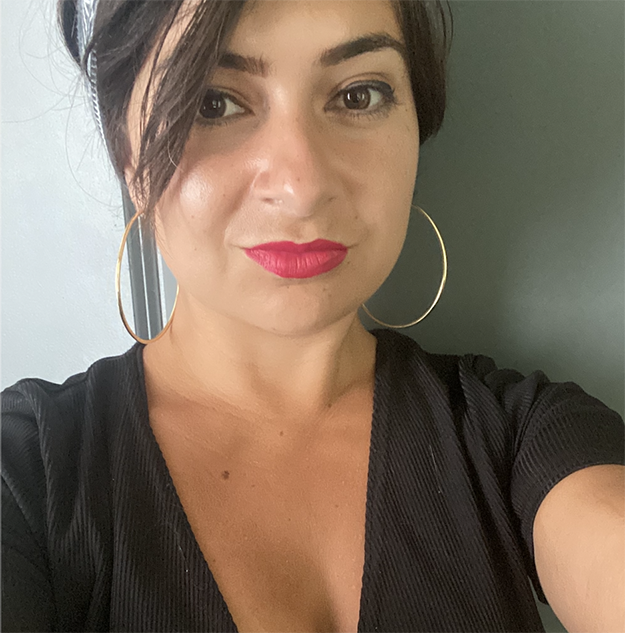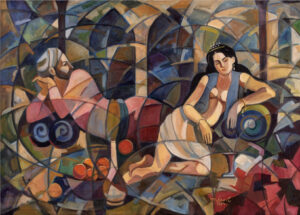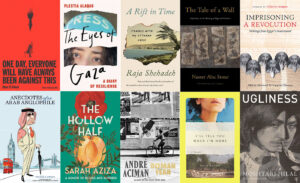Anna Lekas Miller reviews a new memoir by Mya Guarnieri, in which the story of a romance between an Israeli woman and her Palestinian partner ultimately builds a case for one state where everyone has equal rights.
Crossing the Line by Mya Guarnieri
Red Lightning Books, 2025
ISBN 9781684352425
Over the years, dozens of artists have attempted to create worlds where Israelis and Palestinians might fall in love. Countless iterations of Romeo and Juliet have played with the theme of forbidden love, notably films such as David and Fatima, which explores the connection between an Israeli soldier and a young Palestinian woman, and Out in the Dark, which depicts a gay relationship between an Israeli lawyer and a Palestinian psychology student.
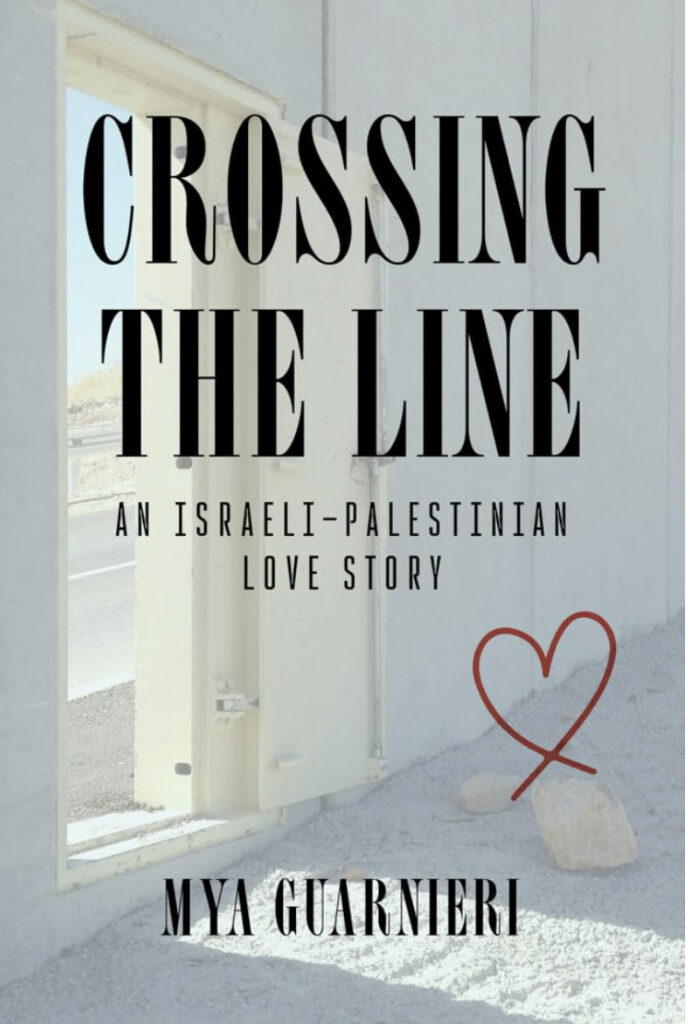
Others have explored what happens when Israelis and Palestinians meet abroad. Israeli novelist Dorit Rabinyan’s All the Rivers follows an Israeli translation student and Palestinian painter who fall in love in New York City. There are real-life love stories, as well. Acclaimed Palestinian poet Mahmoud Darwish fell in love with an Israeli-Jewish woman in Berlin, immortalized as “Rita” in his poem, “Rita and the Rifle.” However, as he details in the poem, there was always a rifle between them, a metaphor for the occupation that follows them, no matter where in the world they might be.
The latest addition to this genre is Israeli-American journalist Mya Guarnieri’s aptly-named memoir Crossing the Line: An Israeli-Palestinian Love Story, which recounts her real-life romance and marriage to Palestinian journalist Mohamed Jaradat. Mya first meets Mohamed during a somewhat illicit reporting trip in the West Bank. Even though she isn’t technically allowed to be in the West Bank as an Israeli citizen, she is working on a story about the PLO’s bid for membership at the United Nations and needs a translator. Enter Mohamed. Even though she is almost immediately drawn to him, she decides to keep the relationship strictly professional — he’s a Palestinian living in the West Bank and she’s Israeli. Romantically, it feels doomed from the start.
Nevertheless, her crush persists — and soon it becomes clear that the feelings are mutual. Even when they aren’t working, they spend long hours in his office in Ramallah discussing politics and discover that even if they’re coming at it from different perspectives, they generally see things eye-to-eye, both of them staunchly opposed to the occupation. But when she confides her crush to a friend, she is advised to nip any romantic feelings in the bud.
“Think this through a bit,” asks the friend. “If this works — and it probably won’t, these things never do — where will you even live?”
It’s a fundamental question. First, there is the wall and the checkpoints. Mya isn’t technically allowed to be in the West Bank as an Israeli citizen and Mohamed isn’t allowed past the checkpoints without a permit. Even going on a date requires one of them to take on some level of risk. Then there are the laws that shape the ways in which they move through the world — and crucially, the country that they both call home. As an American Jew, Mya was able to waltz into an Israeli government office and easily obtain Israeli citizenship. Meanwhile, Mohamed needs to wait in line for long hours and ask for permission from the occupier to cross most checkpoints. Even if they both agree that the occupation is wrong and dream of a shared homeland with equal rights for everyone, their different IDs — and the privileges they carry — is a constant reminder that one of them represents the occupier, the other, the occupied. More than once, Mya wonders if this alone will end their romance. Just a few days into their courtship, Mya learns that one of Mohamed’s cousins has died in an Israeli jail. She wonders if he’ll ever want to speak to her again and admits to herself that she wouldn’t blame him if that were the case.
There is also the prejudice that Mya faces in her own community. Oded, the Israeli boyfriend who teaches her Hebrew and remains a friend after they break up, warns her how dangerous it is for her to pursue stories in the West Bank. While she can dismiss most of this as fear-mongering, there is the reality that if she is caught in “Area A,” the so-called designation of the West Bank where Israeli civilians are forbidden from entering, the Palestinian Authority could arrest her and turn her over to the IDF. When she takes a job as a lecturer at a Palestinian university, she is instructed by her higher-ups to keep her Israeli ID a secret from her students and colleagues.
Even without the logistical complications of apartheid, politics bubble up in the most intimate moments. Finding somewhere to make love requires trusted allies and elaborate plots. Landlords are inevitably nosy. The smaller the village, the more people talk. Privacy, especially the kind needed by two lovers to figure out what they mean to one another, is virtually non-existent.
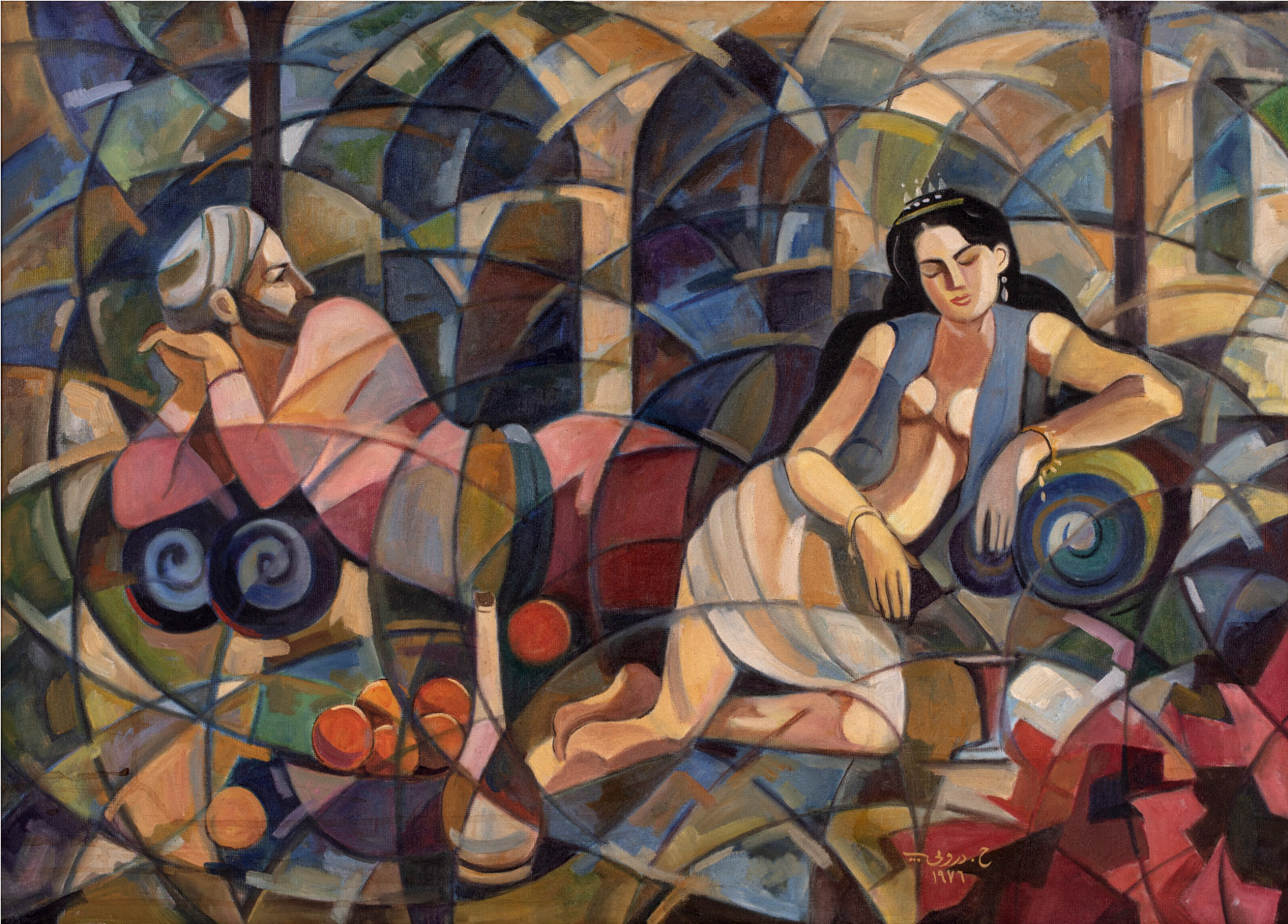
And then, there is family. While getting serious — a husband, not a boyfriend — may seem like the answer for most foreigners acclimating to a society that is slightly more conservative than their home country, for Mya (and her Israeli ID), it presents a problem. Mohamed’s parents can get over the fact that she’s American and quite possibly the fact that she is Jewish. But they cannot get past her Israeli ID. For them, this makes her complicit in the occupation, no matter how much she stands against it.
All of these factors only compound all the ordinary anxieties of a new relationship. The longer Mohamed puts off introducing her to his parents, the more Mya wonders if he is hiding a secret family. Sitting in the apartment that she rented in Bethlehem — one of the only places where she can be both far enough from people who might know him in Ramallah while not having to risk either of them going through dangerous checkpoints quite so often as they would have otherwise — she wonders if she is making a sacrifice for someone who isn’t willing to do the same for her.
It’s an anxiety that I know well. When I first fell in love with my now-husband, a Syrian journalist named Salem, all I could see were the things that we had in common. We both had the same rogue sense of humor and a shared passion for digging into stories that we thought were important. As an Arab American, I’d grown up feeling deeply disturbed by U.S. foreign policies in the Middle East and decided to pursue a career as a foreign correspondent. Salem had experienced some of these firsthand and similarly wanted to show people the realities of war. It felt like poetry to fall in love in Istanbul, one of the only cities in the world where a Syrian and an American might meet and get to know each other.
Still, I knew that our passports might be what finally broke us. As a U.S. citizen, I could travel the world — a privilege that made it possible for me to move to a city like Istanbul and be a foreign correspondent in the first place. Meanwhile, Salem was a refugee, and while he made incredible films about Syria and Iraq, he couldn’t travel anywhere else. When the world started putting up its walls to Syrians, I started to worry that Istanbul might not be our romantic oasis for much longer.
Our worst nightmare became true when the Turkish government started cracking down on Syrian refugees. Salem was deported to Iraq, where he’d been covering a story. At that moment, I had to choose: do I take a chance on love and use the privileges afforded me by a U.S. passport to follow him? Or do I choose to keep working as a foreign correspondent and travel wherever I pleased?
Ultimately, I followed him. Now, I remember that moment as one that showed us how important we were to one another, how painful it was to imagine a future without each other. Borders — and the desire to make sure that they never kept us apart — gave us the strength to commit to one another with a force that feels stronger than most wedding vows. I was able to continue my career and keep telling stories — it just looked a little bit different than I’d imagined. Still, I’d be lying if I said that there weren’t times that I wished we could just be an ordinary couple. Like Mya, I wondered what it would be like to take our time and get to know one another without the injustices of the world looming over us.
While Crossing the Line ends long before the October 7th attacks and Israel’s ensuing genocide in Gaza, it is easy to hear the tensions rumbling. Guarnieri describes arriving in Israel with the open-minded curiosity of someone who unsurprisingly falls into journalism and gets Israeli citizenship to make it easier to stay. She brings the reader along on her journey as she begins to critically examine her relationship with her adopted country, wrestling with the privileges she receives as a Jew compared to others. First, she notices the undocumented children of migrant workers, who had no right to be Israeli simply because they weren’t Jewish. Later, there were reporting trips in occupied Palestine and a job as a professor at a Palestinian university. She heard countless stories of the Nakba and taught students who had to go through military checkpoints to get to class. And of course, there was Mohamed.
Even so, she doesn’t shy away from describing the sense of belonging that she felt in Israel as an American Jew who had never fit in back home, or talking about the magnetic pull of the Jewish homeland, whether through expertly-crafted propaganda trips like Birthright or the romance of the way that the light dances on the Mediterranean. She is honest when describing the visceral anger that she feels when someone tries to imply that she doesn’t belong on the land, the way that it makes her argue political points that she “doesn’t even agree with.” These moments make the narrative more politically complicated than that of a Jewish American who embraced Israel as a homeland or a Jewish American who thinks that Israel should have never existed in the first place. Instead, she documents for the reader the various ways that her mind was forced to open, letting us in on the ways that her worldview becomes messier as she realizes what she can and cannot reconcile.
At a time when many in the West dismiss any discussion of Israel and Palestine’s future as “complicated,” Guarnieri lets the reader see how these complications can play out in real life. She takes a kind but critical look at the version of herself that first arrived in Israel — young, reeling from a traumatic rape that felt distinctly antisemitic, ready to embrace any place that made her feel safe enough to call home. As her relationship with Mohammed evolves, she realizes, again and again, that what she once thought was a sense of safety as a Jew living in Israel comes at a devastating cost — a violent military that enforces the occupation, arrests people at checkpoints to keep people in line, and perpetuates a history of violent expulsion, protecting Israeli settlers and driving Palestinians off their land. Still, she never regrets her decision to become Israeli — rather, she sees this as a deep commitment to playing a role in helping reckon with these realities and paving the way towards a more just future. She lets readers in on her struggle with her changing feelings towards her adopted homeland, all while documenting the physical and emotional barriers that a couple like her and Mohammed must face to be together, and through this, builds a case for one state where everyone has equal rights.
There are moments of romantic magic where this state almost feels possible — a first kiss in an olive grove where the landscape is undisturbed by borders, a necklace with a coin from the British Mandate era, its dual language text (Hebrew and Arabic) a symbol of two people able to coexist before the occupation.
But there are also deeply painful moments. One memorable scene comes when Mya proposes a date in Tel Aviv. “Are you sure about this?” she asks Mohamed, knowing that this involves him sneaking across a checkpoint and potentially getting caught.
“This is my land,” he tells her. “They’re not going to tell me when and where I can enter. If I want to go to Tel Aviv with my Jewish girlfriend, I’m going to do it.”
Once they cross the checkpoint safely, Mya is excited. She wants to introduce him to her friends and show him all of her favorite places. But as the day goes on, Mohamed becomes more and more withdrawn. Later, they get into a fight. “You have no real connection to this place,” he tells her. Even though she understands where he is coming from, she becomes upset. “Nothing I showed you today matters?” she asks him. Even though she understands his connection to the land, she wants him to see hers, too. They fight for hours and hours, and it shows that even when they can cross the physical borders that often get in the way of their relationship, the emotional ones — entrenched by expulsion and occupation — are just as fraught.
Reading the book at a time when Israeli families are embracing their loved ones who have been held hostage for two years while Palestinians are carrying the monstrous grief of two years of genocide — including being unable to celebrate the release of loved ones tortured for years — made me wonder how this love story would have turned out in the present day, when the injustice of the situation has overspilled into the wider political consciousness in such unprecedented ways. In the epilogue, Mya shares that even though in the end, she and Mohamed split, they were a source of comfort for one another during these times, watching in horror from the United States as the October 7th attacks and the genocide in Gaza unfolded, feeling the pain of their homelands an ocean away. Both unmoored in the United States and no longer romantically entangled, they’re able to grieve together. Still, I wonder how this would have played out had they stayed in Palestine. Ten years ago, a simple reporting trip to Gaza under siege was enough to make Mohamed question his relationship with Mya, telling her that it was “hard to even look at her” knowing that she was Israeli and, on the basis of nationality, complicit. Mya has an enormous fight with Mohamed when she learns that one of his cousins was a suicide bomber and he doesn’t immediately condemn her actions. I wonder if the space that they created to understand one another would have held up in an environment where their differences were in such stark relief.
Ironically, it is Mohamed’s younger brother being picked up by U.S. Immigration and Customs Enforcement (ICE) in South Florida in early 2014 that gives them an out. It just so happened that Mohamed had applied for a U.S. visa to go meet Mya’s parents, an opportunity he uses to try to get his brother out of immigration detention. In the United States, once Mohamed realizes the freedom of driving with no checkpoints, he decides he can let go of his own romantic aspirations to live and die on Palestinian land. He embraces a new country in favor of a reality in which he and Mya can live an ordinary life.
This reality, too, seems impossible today as I find myself wondering if this version of my country, where people can move freely without fear of being stopped at a checkpoint or questioned for their right to be there, still exists. As I write these words, ICE agents are descending on cities like Chicago, rounding up immigrants to fulfill Trump’s aspirations to deport one million people by the end of the year. While this used to only feel like a clear and present danger for families who were living in the United States without papers, it now feels like an aggressive campaign against documented and undocumented immigrants alike. Couples and families are caught in the crosshairs as policies that once protected immigrants are stripped away for the sole purpose of punishing people and making them feel as if they don’t belong. It is eerily similar to the way that the Israeli Defense Forces raid Palestinian villages and refugee camps at night, arresting young men and breaking families apart to send a message that they do not belong.
There are also the Trump administration’s crackdowns on anyone who vocally supports Palestine. Even though there has always been an undercurrent of suspicion that any criticism of Israel constitutes speech that is not quite as protected as we’d like it to be in a country that allegedly values its freedom of speech and opinion, it’s now become impossible to deny after October 7th. Under both the Biden and Trump administrations, professionals and students have been punished for activism. It is Trump, however, who has openly normalized ICE and the Department of Homeland Security going after legal permanent residents and prosecuting them with a view to deportation, as they are currently doing with Palestinian activist Mahmoud Khalil and other international students who participated in solidarity protests.
Still, even the bittersweet ending of Crossing the Line reminds one of a time when falling in love in New York City — or South Florida — offered people a safe haven to get to know one another away from the fraught politics of their homelands. In the epilogue, Mya shares that, after having two beautiful children, which helps bring her closer to Mohamed’s parents, she and Mohamed decided to amicably split for reasons that had nothing to do with politics. For a couple who has had to navigate so many forces outside of their control to be together, the freedom to decide when to go their separate ways on their own terms oddly feels like the happiest ending of them all.



